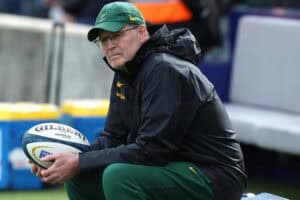It is really such a sad story that the country’s trajectory has not in any way matched that of the Springboks.

This year’s Heritage Day came right in the middle of the Rugby World Cup, with the Springboks once again called upon to provide much-needed relief to citizens from their daily lot of crime, unemployment and power blackouts.
The usual mocking of Heritage Day by those opposed to it seemed to take a backseat this year as people fused their support for the national rugby team with their traditional outfits, signalling that the Springboks have crossed that threshold in the national consciousness to a point where everyone can see a bit of themselves in the squad’s success.
ALSO READ: Our heritage is reduced to a braai because we have few things left to celebrate
This is one project that the father of nation, Nelson Mandela, left behind and it is still fulfilling his wishes.
It was not always like this though.
Mandela had to put in a lot of spadework to get the Springbok symbol and the national rugby team to be accepted as part of the new dispensation going forward.
Not that the sport would have been outlawed without his intervention, but it could have continued to be seen as representing everything that is white and privileged.
Without his intervention to elevate the team to the national building symbol that it is today, the sport and the Springbok symbol stood every chance of becoming a sore point and a reminder of South Africa’s painful past.
Mandela’s unmatched ability to look into the future and do the dirty work to achieve that future was helped in a big way by the Springboks’ response of making winning a habit.
When he first suggested that the Springboks can be a nation-building project, he received a lot of scorn from his fellow countrymen who saw it as selling out.
This was also accompanied by a lot of resistance from a section of the country that felt that transforming rugby was like taking away one of the very few symbols that made them feel South African.
READ MORE: Boks have no preference between France and New Zealand, says Etzebeth
And it is in that mess of mixed political emotions that Mandela elevated the green and gold to come to represent symbols of pride and success for South Africa.
It has become part of democratic South Africa’s folklore that the Springboks have presented the honour of lifting the Webb Ellis Cup only to presidents whose reign meant something positive for the country: Mandela, Thabo Mbeki and Cyril Ramaphosa (although it can be argued that the current president has done a lot to undo the goodwill that the Springboks gave him in advance in 2019).
It is really such a sad story that the country’s trajectory has not in any way matched that of the Springboks.
They have always responded to the challenges of having to effect transformation without necessarily resigning themselves to the lazy idea that elevating sections of the population that were previously excluded means a lowering of standards.
On the eve of the Springboks winning their second World Cup in 2007, Mandela’s words to the team included the following: “We have overcome much to be where you are… play the game hard and honestly. And whatever the outcome, hold your heads up high.”
These words should be words that each successive government in this country should be applying to itself.
READ MORE: Boks draw on 2019 ‘hiccup’ for inspiration to go all the way in 2023
If the government could match the spirit of the Boks and knuckle down to provide the best they can for this country, then things would be totally different.
The biggest promise that the Springboks represent for this country is not only being victorious.
It is the idea that out of a murky and racist past hope can be built.
Hope that people from vastly different backgrounds can work together and make South Africans proud.
Support Local Journalism
Add The Citizen as a Preferred Source on Google and follow us on Google News to see more of our trusted reporting in Google News and Top Stories.






